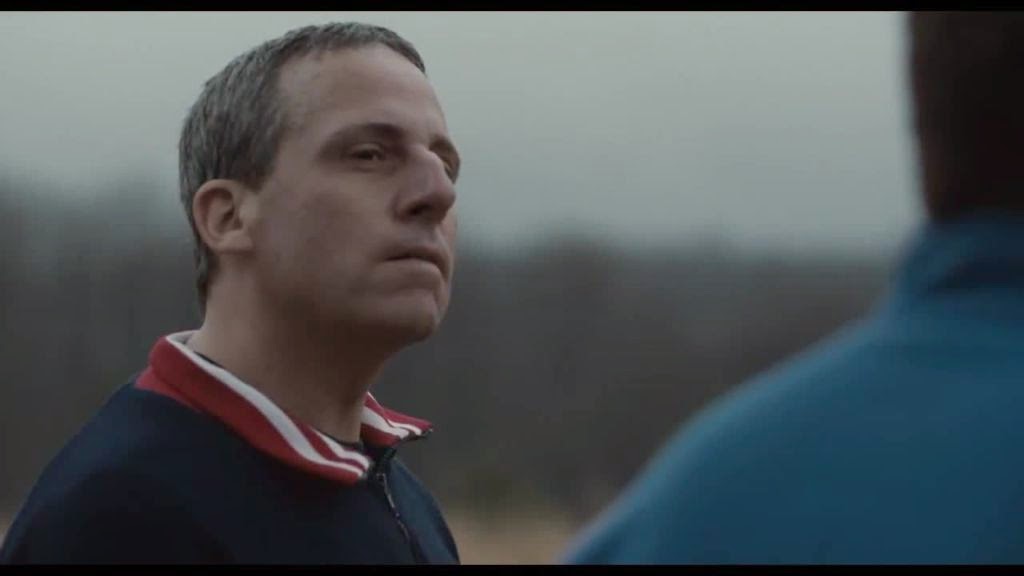or
"Highly Respected Ornithologist, Philatelist, Philanthropist"
"Let me tell you about the very rich. They are different from you and me. They possess and enjoy early, and it does something to them, makes them soft where we are hard, and cynical where we are trustful, in a way that, unless you were born rich, it is very difficult to understand. They think, deep in their hearts, that they are better than we are because we had to discover the compensations and refuges of life for ourselves. Even when they enter deep into our world or sink below us, they still think that they are better than we are. They are different."
F. Scott Fitzgerald "Rich Boy" (1925)
Mark Schultz (Channing Tatum) is an amateur wrestler. He has some great success, winning an Olympic gold medal in the 1984 Los Angeles games, along with his brother David (Mark Ruffalo). Both Mark and Dave are in training for the World Wrestling Championships and Mark is unhappy—you can tell by the set of his jaw (Tatum puts in a great performance, certainly deserving of some sort of awards recognition). He's hungry and dissatisfied. Dave is settled—he's married (Sienna Miller, in another loyal wife role), has two kids and is entertaining coaching offers. The frustration erupts when the two are sparring, Mark bloodying his older brother in the practice.
Then, Mark gets a phone call. He's offered a chance to fly out to the estate of the du Pont family where John du Pont (Steve Carell, encased in a face-altering makeup) wants to start a wrestling team to win the next Olympics gold. Du Pont is different. He talks in quiet, measured tones, his face uplifted, so as to look down his nose at whoever he's talking to. He talks a good game...about America's athletes deserving respect, America needing its heroes, about taking care of Mark and going so far as to show off his plush training center he's already built. Mark is psyched. Going home, he tries to convince Dave to join him at Foxcatcher Ranch (after the family's weekend hunting matches). Mark demurs, not wanting to uproot his family. But it's a chance for Mark to get out of his brother's shadow, and doesn't think any farther when Dave asks "what does he get out of this?"
At the ranch, du Pont is disappointed. "What does he want?" "I don't think you understand," says Mark. "He's not about that." "What?" du Pont snaps back.
Things go well, despite some low-level alarms. Du Pont is odd, inhibited and secretive. The whole compound is like that. Mark is warned away from John's elderly mother (Vanessa Redgrave) whose life revolves around her champion horses. For his part, John, despite his diminutive stature, never lets anyone forget who is in charge, always scrutinizing everyone he's in contact with. He also has a gun fixation, allowing local police to target shoot on his property, so he can participate. This is followed by him showing up at the training facility, pistol in hand, and firing it in the air. "Let's have a good practice, shall we?"
 |
| "One of these things don't belong with the others..." |
Well, sure, since you asked so nicely, but that shot might be more appropriate for track and field than wrestling.
Then, du Pont asks Mark to do a dog-and-pony show for a dinner attented by du Pont's mother. He pre-functions with cocaine and wants to go over Mark's speech, which du Pont's aides have crafted heavy with puffery. Du pont is mentioned as a "world-respected author, ornithologist, philatelist (he collects stamps), world traveler, and philanthropist." No mention is made of him being a coke-head, a momma's boy, and a creep. Or that he's basking in Mark's reflective gold glory. "Ever shake hands with a world champion?" he asks the movers and shakers at the soiree, repeatedly.
Du Pont is volatile and privileged. He's not too communicative and when things don't go his way exactly as he envisions it, he'll become anti-social—at the very least withdrawing without a word of explanation, and at his worst, lashing out in a tantrum. For Mark, whose family split up when he was two and for whom his brother Dave has been his entire support system, du Pont's volatility is soul-crushing, affecting his attitude and performance. When Mark fails, du Pont becomes resentful and vindictive. It's a downward spiral. For Mark, it must feel like having both shoulders pinned by am unworthy adversary with advantages.
This is the third film for Bennett Miller, who also directed the excellent Capote and a favorite of mine from a couple years ago, the audience-neglected Moneyball. Miller has an eye for an arresting image and for a telling detail—with a documentarian's sense of finding something interesting wherever he sets his camera. He's also terrific with actors, throwing them into a mix of pro's and authentic-looking and -acting amateurs, improving the verisimilitude of both. He brought out the best qualities of Brad Pitt and Jonah Hill in Moneyball, while his Capote star Philip Seymour Hoffman hung back and excelled in a very non-showy role. Here, both Steve Carell and Channing Tatum do some of their best work in film, Mark Ruffalo quietly plays the voice of reason that is David Schultz. They're all dark, tense performances that keep an audience off-guard until the final devastating take-down that leaves you shaken, but not surprised. Miller is turning into one of our better, most-dependable directors, able to craft unlikely material into a satisfying viewing experience.
John duPont at his arrest
...and the brothers Mark and David Schultz









No comments:
Post a Comment